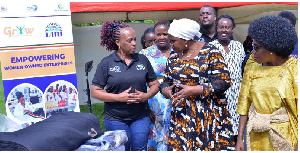 Third Deputy Prime Minister Lukia Nakadaama (R) and women of Bugweri district
Third Deputy Prime Minister Lukia Nakadaama (R) and women of Bugweri district
When her 14-year-old daughter got pregnant in 2021 before sitting for her Primary Leaving Examinations (PLE), Ms Sarah Kagoya* (not real name) said she had nothing to do because the trend is not unusual in her sub-county.
The resident of Buwooya village, Buyanga sub-county, says she has seven children. She is a sole breadwinner in her family because the relationship with the father of her children failed.
He wanted over 15 children.
“Our daughter was exposed to young men because we had no one to keep an eye on her, considering that I had to trek to another village to look for banana leaves to be sold to take care of the family,” Ms Kagoya told Monitor on June 4.
She added: “When my daughter conceived, I had nothing to do because that is not unusual in our sub-county. However, after nine months, she gave birth to a baby girl, who is soon turning three years old.”
Ms Rodah Namuwaya, another resident, says her 15-year-old daughter refused to complete primary education and eloped with a man in the village.
“In 2023, my daughter eloped with a boyfriend and the two eventually live together as husband and wife. I decided to break the news to her father, who instead told her to leave her and we focus on her younger siblings. I had to accept my husband’s decision,” she said.
The chairperson of all local council chairpersons in Bugweri District, Mr Yusuf Sonko, says most parents in Buyanga sub-county are ignoring seeking justice for their defiled girls after reportedly trying and failing, a trend he says has left many of them resigned to fate and being in comfort zones.
“You know, parents are getting used to such cases [defilement] that is why it is not easy for us [leaders] to trace problematic young girls. However, parents must know that there are tough laws against such cases,” he said.
Meanwhile, in a bid to curb defilement in Busoga sub-region, the government has come up with training centers to skill young girls and women in different sectors under GROW, a World Bank-funded programme.
Ms Dianah Naturinda, a communications specialist in the programme, says GROW seeks to increase women’s access to entrepreneurial services.
“The target of this programme is to grow women businesses from micro to Small Medium Enterprises (SMEs) and large enterprises and we target all businesses as long as the women are able to earn from that business,” Ms Naturinda told Monitor in an interview.
Head of Human Resource at Uganda Industrial Training Institute, Ms Neumbe Nabudere, said over 530 women have been trained while 76 women have graduated in entrepreneurship.
Bugweri District Woman Member of Parliament, Ms Racheal Magoola, says Grow programme has developed and should have a permanent home, adding that they cannot develop while still renting.